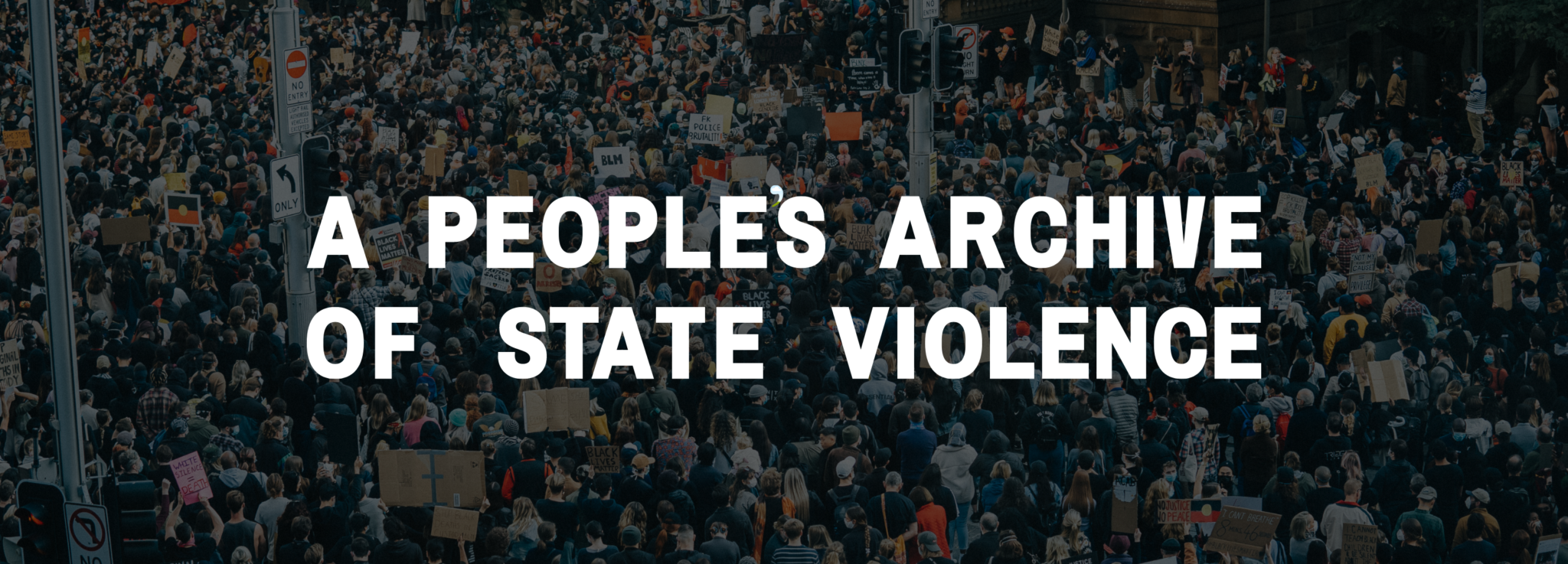A People’s Archive of State Violence collects, preserves, and shares the stories, memories, and accounts of police violence as experienced or observed by the People. The archive hopes to provide the People, wherever and whoever they may be, a safe and secure space to share any testimony, documents, or accounts that narrate or reflect on encounters or effects of police violence in their lives and communities.
State violence extends beyond police violence, though police are certainly agents of the state. The poisoned waters in Flint, Newark, and Pittsburgh are violent. The jailing of indigenous activists, water protectors, and environmental activists is violent. The deportation, separation of families, and caging of immigrants by ICE is violent. The death penalty is certainly violent, as is the criminal punishment system, mass incarceration, and the poverty and suffering caused by it.
Since 1980, over 17,000 police killings have gone unreported. What can this statistic tell you about the grief and trauma of the families of each of those victims? In 2020, ~13% of the US population identified as Black; 26% of the victims of police killings are Black. Despite making up close to 5% of the global population, the U.S. has more than 20% of the world’s prison population, disproportionately made up of Black and Latino individuals. For every $1 that a White man earns, an African American woman earns $0.61 and a Latina earns $0.54. ICE books an average of 8,400 people a month. This list could go on forever.
Do these statistics tell the stories of mothers, fathers, siblings, sons, daughters, and friends who will never see their loved ones again? Of being incarcerated in an unjust system? Of being deported and separated from one’s family? The suffering of a human being cannot possibly be contained in a single data point. This dehumanization serves a purpose, to distance the viewers/readers from the very real impact of systemic racism. This archive seeks to combat this by sharing intimately the personal experiences of the People.
All stories are added to the archive as they are received; we do not change or edit submissions other than to scrub the identifying data from files.
New Stories
Driving My 1983 Regal Limited
Interviewee: (00:00) But um, I was driving, I’d just gotten my license, my dad had just put the finishing touches on my new used car, my 1983 Regal Limited. And it was at night, and I cannot remember if I was deriving myself home from work or what the circumstances were as far as where I …
Unnamed Oral History Interview
Interviewee A: When my children were little, I told them very simply, if we get pulled over you stay very still. You don’t come from a background that’s wealthy enough for you not to get killed in the car seat. Don’t fucking move or talk. Interviewer: Have you ever had, like, a negative experience with …
Unwanted Advance
I learned to hate the pigs when I was a 16 year old girl. I was a high school student at Bellevue West. A Bellevue Police Department officer pulled me over one day on my way back home at about 36th and Cornhusker for speeding. I was speeding because I was late for dinner, I …
Police and Mayor Lie to Public
I attend day one protest as well as day 2. Day 2, the tone was very different on 72nd and Dodge. I spent the day there. There were 2 arrests of individuals who walked in the road, and 1 bottle of water thrown at police, to which the protesters found [the person who there it] …
Gardner Memorial Gathering
Me and my mother drove by and I shouted out the back seat driver side window Fuck Jake Gardner. We drove by twice with me repeating Fuck Jake Gardner. Then the police came after us after the second time. They pulled us over and it was not one car it was 3+police cars and they …
Protest 2020
I was was sitting at the entrance of Target on 72nd st, my mother was standing there by me when police shot 7 tear gas canisters toward case street then moved up the side walk towards me and my mom. When they reached us the police began to kick me to make me get up, …
Bum Rush The Crowd
Attending protests for the murder of Kenneth Jones by the Omaha Police Department. I arrived at the OPD Headquarters shortly after 6pm, and only a few protesters were gathered. Over the next few hours, this number increased to ~100 people. We chanted demands for the OPD to release the body cam footage of Kenneth Jones’ …
